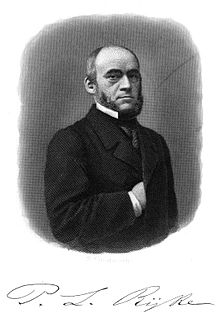Pieter Rijke
| Pieter Rijke | |
|---|---|
 |
|
| Born |
July 11, 1812 Hemmen, Gelderland |
| Died | April 7, 1899 (aged 86) Leiden |
| Nationality | Dutch |
| Fields | Physics |
| Institutions | University of Leiden |
| Alma mater | University of Leiden |
| Doctoral advisor | Pieter Johannes Uijlenbroek[] |
| Doctoral students |
Johannes Bosscha Hermanus Haga Hendrik Lorentz Johannes van der Waals |
Petrus Leonardus Rijke (July 11, 1812 – April 7, 1899) was a Dutch physicist, and a professor in experimental physics at the University of Leiden. Rijke spent his scientific career exploring the physics of electricity, and is known for the Rijke tube. On July 1, 1852 he was married to Johanna Hamaker. They had 6 sons and 6 daughters.
Rijke was born in Hemmen, (now Overbetuwe municipality), Gelderland. His father, Dirk Rijke, was a pastor. His mother was Elisabeth Pieternella Beausar.
From 1830 Rijke studied physics under Pieter Johannes Uijlenbroek[] at the University of Leiden, where he obtained his Ph.D. in 1836. The title of his Ph.D. thesis was "De origine electricitatis voltaicae".
In 1835 he was appointed professor of physics at the Royal Athenaeum in Maastricht. In 1845 he became extraordinary professor and in 1854 he was promoted to full professor of physics at the University of Leiden.
There he started a physics laboratory with a large collection of scientific instruments. His most important students were H.A. Lorentz and J.D. van der Waals. He retired in 1882, and was succeeded by Heike Kamerlingh Onnes as professor of experimental physics at the University of Leiden.
Rijke became a member of the Royal Netherlands Academy of Arts and Sciences in 1863.
...
Wikipedia
